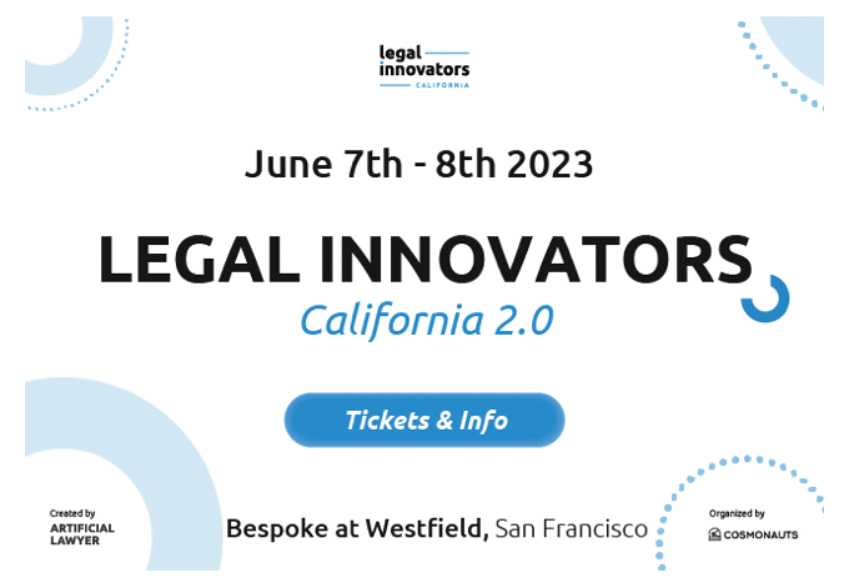
What is Justice Tech? Why does it matter to all of us? And are VC funds looking to invest in it?
One of our keynote speakers on Law Firm Day at Legal Innovators California on June 7 and 8, is Maya Markovich, who is currently Justice Tech Executive in Residence at Village Capital and Executive Director at the nonprofit Justice Technology Association.
Artificial Lawyer asked her some questions about: What is Justice Tech? Why does it matter to lawyers and legal innovators whichever firm or organisation they work with? How does this connect to regulatory change in the US? What about the impact of AI? And do funds want to invest in this area? Find out below and hear Maya speak at the landmark legal innovation conference in San Francisco on June 7 and 8. For more details please see here.
—
- What actually is justice tech and how is it different to legal tech in general? (And could you please give a couple of examples of such companies/projects?)
In terms of our membership at the Justice Technology Association, a trade group for justice tech startups, we define justice tech as innovative technology designed to improve access to one’s legal rights, improve outcomes for justice-involved individuals, or more equitably administer a legal system – technology that helps people navigate legal matters and meaningfully better their lives, primarily though not exclusively through a B2C business model. For example, Easy Expunctions leverages technology in a streamlined and cost-effective solution to clear criminal records. People Clerk empowers individuals to navigate small claims disputes in an easy and affordable way, helping people prepare, file, and serve their small claims lawsuits.
VIllage Capital, a VC firm that invests in early-stage companies solving global problems, defines justice tech more broadly as technology-enabled innovation that supports people affected by the criminal and civil justice system, their families, and the organizations that serve them. It encompasses comms tech startups like Pigeonly and Flikshop that keep incarcerated people connected with their loved ones and legal tech like Paladin which streamlines the supply and demand of pro bono opportunities for lawyers.
The common thread is the commitment to ensuring the tech centers consumer benefit and mitigates consumer harm. JTA has a comprehensive code of ethics to ensure our member companies are aligned on this front, regardless of the access to justice challenge they aim to solve.
- What is the current situation in the US for access to justice among regular folks and small businesses?
The access to justice gap in the US is enormous and growing. The US is ranked #126 of 139 countries when it comes to affordability of access to the legal system. In 75% of US court matters, at least one party is self-represented, and it’s often much higher. Legal Services Corporation’s 2022 Justice Gap study found that 92% of the civil legal problems of low-income Americans did not receive any or enough legal help, up from 86% in 2017.
Small and micro businesses also have trouble accessing the court system, as a result of either inexperience, lack of understanding, or inability to afford an attorney. Access to justice efforts are often focused on individual legal support for a crisis point such as eviction, but should also include access to proactive business legal assistance as well, addressing gaps upstream to head off subsequent potential harm resulting from the inability to navigate the system.

- Are investors interested in justice tech companies, or is it mainly Pro Bono and Legal Aid groups that are supporting its growth?
Justice tech is a nascent sector, but the investment landscape is strong as it’s quickly being discovered not only by impact investors looking for another way to effect positive change through their funding, but also those who want to invest in technology with the capability to disrupt an antiquated system – one of Silicon Valley’s favorite themes – and there’s arguably no system more antiquated than legal. These elements together deliver a high potential for ROI on a double bottom line. Last fall AngelList sent out a newsletter about justice tech – they got it mostly right, and cited a lot of our work, so we see that as a net positive in terms of increased awareness. Investors are actively looking for dealflow, and we have a number of them on our advisory board. One reason JTA is getting so much traction from VCs and founders is that they see the organization as not only an aggregator and central hub, but also a filter for mission-focused justice tech startups.
- Do you think LLMs and the new AI tools can help? If so, how?
Generative AI has the potential to be a huge help for increased access to justice. We see applications in areas like supporting legal services organizations and justice tech companies both in delivering support at scale by, for example, expediting staff attorney review of volunteer advice, and streamlining administrative tasks through automation, provided they are protected from automation bias. We think it’s too early to consider the use of LLMs directly for end users, because the tools are not reliable enough on their own without a trusted human intermediary and could exacerbate issues rather than solve them.
- One answer proposed by some is to allow more people to get legal help without lawyers, so that it’s cheaper, e.g. using tech solutions. Is this workable, given regulatory barriers and also genuine concerns over ethical risks to totally ‘self-service’ legal help?
Some numbers can illuminate the critical need for more alternatives to obtain help with a legal issue. Of 121 million US households, 62% report at least one legal problem, with an average of 3 legal problems. Attorney rates in the US average $300/hour. If one hour with an attorney were allotted for each problem, it would cost over $60 billion – more than is spent on all state and federal public criminal defense and the DOJ budget combined. We spend $1.8 billion, which is only 2.7% of our estimated need, and there are nowhere near enough lawyers to help everyone who needs assistance. Legal aid and pro bono are doing incredible work but are overstretched and under-resourced. They should not be expected to bridge the gap on their own, which is why we believe that technology can and should be part of the solution.
- At Legal Innovators many in the audience will be from big firms and large companies, why is A2J tech also very relevant to them?
JTA’s founding team has an unshakeable belief that this issue matters to all lawyers – and society writ large. Attorneys take an oath to promote and pursue justice – supporting access to justice initiatives and JTA are opportunities to take action on that obligation, and we’re seeing a great deal of inbound interest on just that. In addition, when such a vast majority of the population has no access to legal assistance, it’s expected that democratic and market pressure will ultimately upend the profession – Big Law can and should help shape the change. Lastly, it’s just good business to do the right thing and help those who need it.
—
Thanks Maya! Looking forward to hearing you speak at Legal Innovators California, June 7 and 8 in San Francisco.
If you would like more information about the two-day event in San Francisco, please see here. Day One will focus on a range of issues for law firms and ALSPs, and Day Two will focus on inhouse and legal ops.
To get your tickets and book your place at the landmark legal innovation conference in San Francisco this June please see here.
See you all there!

—
About the Author:
With her background spanning VC, law, behavioral science, and change design, Maya Markovich delivers technology, process, and business growth services worldwide. For nearly 6 years she launched and scaled industry-first Nextlaw Labs/Nextlaw Ventures at Dentons, the world’s largest firm, delivering next-generation technology, process client and business growth services across the globe. Maya is currently justice tech executive in residence at Village Capital and executive director at the nonprofit Justice Technology Association. She also advises multiple high-growth startups, investor and venture funds, and consults on legal department and law firm innovation and transformation initiatives, building future-proof methodologies and tech to advance the legal industry, its clients and consumers via achievable, sustainable and scalable
design and implementation.
In 2020 Maya was named one of five ‘Influential Women of Legal Tech’ by ILTA, a ‘Woman Leading Legal Tech’ by The Technolawgist in 2019, and an ABA Legal Technology Resource Center ‘Woman of Legal Tech 2018’ for her work in designing, promoting, and driving the future of the legal industry around the globe.